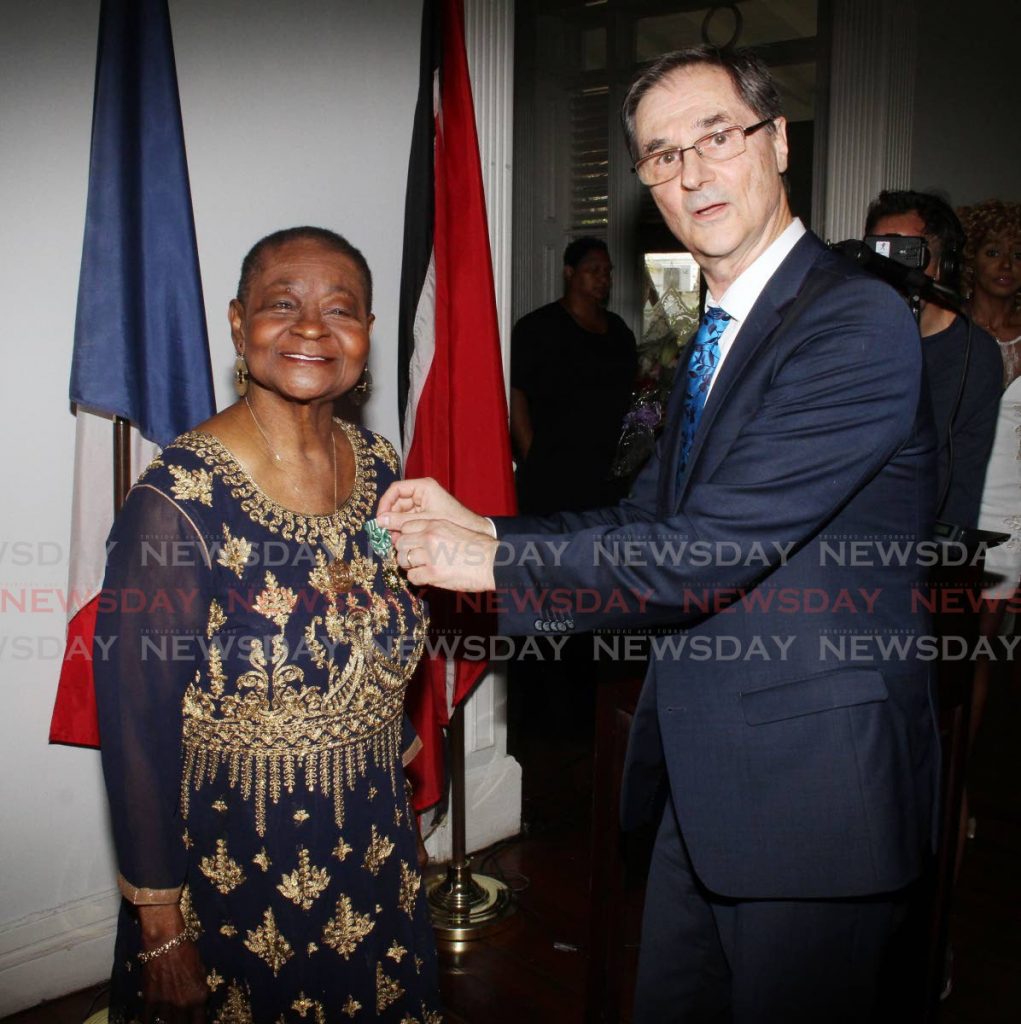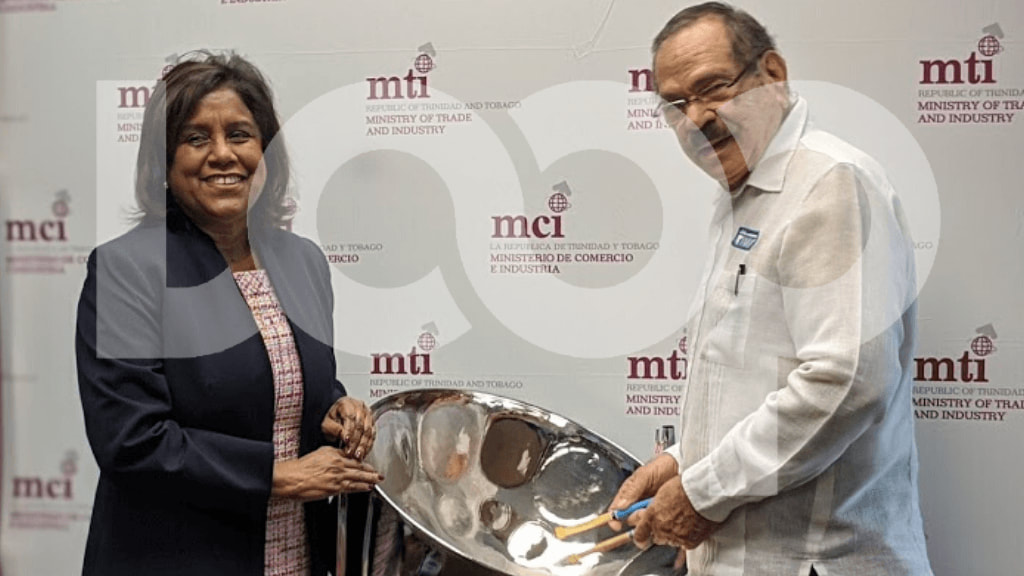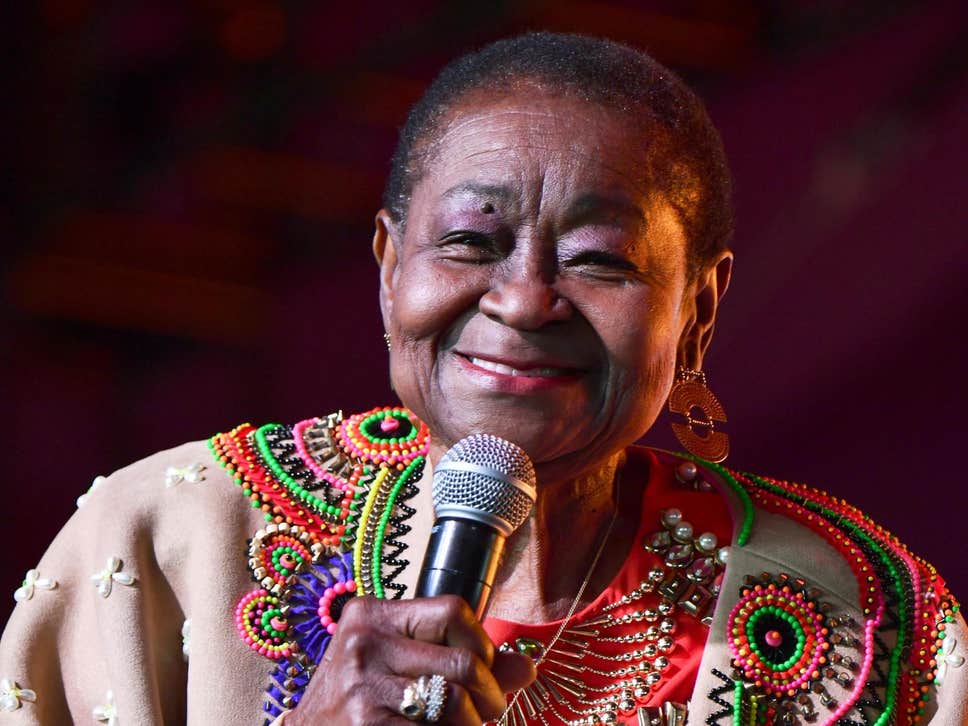|
Linda McCartha Monica Sandy-Lewis aka Calypso Rose, is presented with the Officer of the Order of Arts and Letters, the highest French award for Arts and Culture, from French Ambassador Serge Lavroff, at the French Embassy, Mary Street, St, Clair on Thursday. - ANGELO MARCELLE CALYPSO ROSE, one of TT's most distinguished international artistes, has received yet another prestigious international award. On Thursday, the 79-year-old was named Officer of Arts and Humanities, on behalf of the French Government, at the residence of the French ambassador to TT.
The award is regarded as one of the highest honours among the four French Ministerial Orders of Merit. She is said to be a well-known name in France and has previously won awards in the country, including the world album of the year award at the Victoire de la Musique awards in 2017, the Grand Prize for world music at Sacem Grand Prix and the 2016 artist award for world music by Womex at the 18th Womex Awards in Spain. The ever-smiling Calypso Rose, whose real name is Linda McCartha Sandy-Lewis, was present at the embassy to receive the award, despite coming off a typically hectic travel schedule. She received a medal and certificate to validate her most recent achievement, which was delivered by the French ambassador to TT Serge Lavroff, who said he, like much of France, is a fan of the veteran singer/songwriter. Source: Newsday, Feb 20, 2020
0 Comments
Trade and Industry Minister Paula Gopee-Scoon (left) and MIC-IT Chairman Prof. Clement Imbert (right). lal Recognising the importance of the country’s national instrument, Government has approved TT$5 million for the establishment of a Steelpan Manufacturing Grant Fund Facility.
Speaking at a media conference on Tuesday, Trade and Industry Minister Paula Gopee-Scoon said the financial support will provide steelpan manufacturers with the means to acquire machinery, equipment, software, tools, raw material and training. The funding will be made available in tranches of up to $250,000, but no more than $1,000,000 per entity. Gopee-Scoon said Government was intent on seeing the country’s national instrument flourish at the global level with input from industry experts, tapping into the industry’s potential for job creation, increased foreign exchange earnings and economic diversification. She urged manufacturers and tuners interested in stepping up their operations to take advantage of the initiative. The Minister noted that the funding would assist in this regard, encouraging the modernisation and the improvement of the quality of steelpan manufacturing operations, ultimately bolstering the export product. “We are confident that the successful implementation of the Steelpan Manufacturing Grant Fund Facility will lead to improvements in the production and tuning processes and enhance adherence to global quality standards. It will also be an important platform towards sustainable employment and expansion of exports of the only acoustic musical instrument developed in the twentieth century,” she said. Gopee-Scoon revealed that the MIC Institute of Technology (MIC-IT) will be responsible for administering this Facility due to its experience in technical and vocational training in steelpan manufacturing. MIC-IT in October 2019 launched a customised steelpan manufacturing programme focusing on knowledge and practical skills in steelpan construction, tuning and fabrication. The institute also runs a course in Mechanical Engineering Technology with Steelpan Manufacturing which provides training in steelpan construction and tuning, science of sound, sound engineering, music, welding and fabrication, mechanical technology and practical experiences on the varying pan manufacturing and tuning equipment. MIC-IT Chairman Clement Imbert, who has a long history of involvement in the development of the steelpan, said the institute’s programmes are oversubscribed with very dropouts. Minister Gopee-Scoon is due to meet with stakeholders to explain the process and identify any additional needs or concerns of industry leaders as she said Government is working to reach the “small man” with the funding. A call for proposals will be published in newspapers and on the websites of the MTI, affiliated agencies and the Tobago House of Assembly (THA). Source: The Loop, Jan 14, 2020 The 79-year-old star tells Helen Brown why she’s had enough of victim blaming at Carnival, about not smoking with her friend Bob Marley and why ‘that Donald Trump does not like nobody, not even himself’ Six months before the #MeToo movement went viral in October 2017, women across the Caribbean were united by a feminist anthem celebrating their right to party without being manhandled. During the annual carnivals in Trinidad and Tobago, women danced through the streets in bikinis, singing Calypso Rose’s “Leave Me Alone”: “Boy don’t touch me!/ I there in the party/ Enjoying my body/ With my friends I am happy/ So leave me alone!”
Their act was political. Local activists said that sexual assaults on women had been tolerated as part of the carnival scene for too long. The previous year Japanese musician Asami Nagakiya was strangled at the Port of Spain carnival. When her bikini-clad body was found in a park the following day, mayor Raymond Tim Kee claimed her clothing had led to her (still unsolved) murder. “The woman has the responsibility to ensure that [she is] not abused.” he told the press. “It’s a matter of, if she was still in her costume – I think that’s what I heard – let your imagination roll.” Seventy-nine-year old Calypso Rose – delighted to be playing at the Womad festival this week – has no patience with such victim blaming. “Carnival is to be loose! To be free! We have to let everybody know that women should not be walking behind the men any more. Women should be walking in front!” she tells me with a broad smile via a video link from France. “I know it is a scary time. But I am here to tell women: don’t be afraid. Enjoy yourselves!” Despite a series of heart attacks and one bout of cancer, the calypso queen is still an electrifying performer and engaged interviewee, regularly breaking off an anecdote mid-sentence to lean towards the camera and sing a snatch of one of her 800 songs, big pearls swinging from her ears. Calypso Rose was born McCartha Linda Lewis in Tobago in 1940. “We had no electricity and there was no music, no nothing to hear at all,” she tells me. “My dad was a preacher and my mum had 11 living children. I was the fifth. It was a lot for her, and I was adopted at the age of nine by my uncle’s wife and went to live in her big house in Trinidad. Suddenly, I was the only child. My auntie – Miss Robbie – gave me all the love she had. I could sit in peace, suck my fingers and play with my pikkie [short, Afro textured] hair!” Miss Robbie also loved calypso music: a genre descended from the west African “kaiso”, sung by the slaves imported to work on the sugar plantations from the 17th century onwards. Under the guise of jaunty melodies, it was used to mock slave masters and communicate. After the abolition of slavery in 1873, calypso music dominated the annual carnivals celebrated in the days before Lent. “My auntie, she had all the calypso records,” says Rose. “She would grind up the gramophone and tell me: dance, dance, dance! On Sunday night she’d take me down to the clubs where they would be singing and moving until Monday morning, oh my God it was fantastic! I was on the roof! My auntie would be wearing her shorts and we were all just wiggling the bamsee [bottom] left-right, left-right.” Rose was just 13 years old when she wrote her first calypso: fighting for justice from the get-go. “In the market one Sunday morning, we saw a guy run up and snatch the glasses from off the eyes of a vendor. We yelled, ‘Thief! Thief Thief!’ Well I went home and wrote ‘Glass Thief’ to warn Tobagonian boys not to be like those naughty Trinidadian boys.” It was the first calypso denouncing sexual inequality. Her second song was inspired by the Can Can dance craze: “I sang about the girls who can can!” But she was writing and singing against the grain. Women were not welcome on stage in the calypso tents of the 1950s. “When I began entertaining at 15,” she says, “They said: ‘Why are you singing calypso? It does not belong to a woman. Calypso belongs to the men.’ Well, I told them the good Lord has given me the inspiration to create and I will not be like the foolish virgin in the Bible. I will not bury my talent in the soil! I will be jiggy jiving! I fought the battle as a woman and I won.” Rose came of age as the world began to embrace calypso. In 1956, Harry Belafonte’s album Calypso spent 31 weeks at the top of the Billboard chart, becoming the first album by a solo artist in history to sell more than one million copies. In 1963, Rose became the first woman to win the annual Calypso King competition with a song called “Cooperation”. Four years later, she was on tour in the US with Bob Marley. “He was such a spiritual man,” she says. “He never lifted his guitar off the stage without putting his head onto the wall and praying. He loved to dance to my songs.” she says. “We learned a lot from each other… except the smoking. I did not learn that. When he was smoking he would try to reassure me saying: ‘No threaten, no threaten.’ He meant: don’t be afraid. And I am lucky that I have never been afraid. The men have always respected me a great lot.” But being barred from the Calypso King contest on gender grounds did cause Rose to quit the scene in the early 1970s. “I went to New York and studied criminology,” she says. “But those steel pans were still playing in my head, they sent me crazy! I kept running from explosives classes to write lyrics in the restroom. And when they changed the title from Calypso King to Calypso Monarch in 1978, I came back for my crown.” Rose still lives in New York, from where she is proud to support the many waves of female calypsonians to have followed in her wake. “I swung back the door and welcome them in,” she says. “Come in! Come in!” She praises a new generation of young artists such as Nailah Blackman and stresses that they must continue to sing up for the women’s rights that are threatened by the current US administration. “That Donald Trump does not like nobody, not even himself," she says. "He should shut his mouth up. Put a clip on his tongue. He should listen to my song, ‘Human Race’. Those Mexican children in cages at the border? It is a pain in my heart.” Featuring no-nonsense lines like “Nobody cannot say this for true/ Who the hell descended from who”, the anti-racist anthem “Human Race” appears, alongside “Leave Me Alone”, on Rose’s 2016 album Far From Home, written with French artist Manu Chao. “Can you believe that I won a French Grammy Award for that record?” she grins. “I’m in Lyon now, on my way to the stage in Barcelona and then your Womad.” Rose says the thrill of performing has only increased with time: “It’s great to sing, it’s great to see the fans. Especially those young-young boys winding it in front of the stage. Oh my God! I’m still enjoying the music, I’m still enjoying me.” Source: Independent, July 2019  Today, the San Fernando City Corporation recognized Pan extraordinaire, Lennox Bobby Mohamed, by renaming Harris Promenade East after him. This gesture was done in recognition of his outstanding contribution to the steel-band art form. Bobby was a game changer and trailblazer, producing a style of music in the 1960s that was unheard of, but no doubt infectious. He brought victory to the southland in 1965 and 1967 as he became the youngest arranger in the history of the competition to win a Panorama title, which he did with his arrangement for the San Fernando-based band Guinness Cavaliers Awesome Nature! The Scarlet Ibis, one of T&T's three national birds, sports the color that is often associated with courage, passion and happiness
 The steelband movement has lost yet another icon with the passing of Dr. Clifford Alexis. Mrs. Beverley Ramsey-Moore, President of Pan Trinbago, has expressed her deepest condolences to his immediate family and that of the steelpan fraternity. Mrs. Ramsey-Moore describes him as a steelpan enthusiast, a cultural icon and son of the soil who was an ambassador for Trinidad & Tobago. She added that he will be sorely missed and wished God’s comfort at this time to all those who were blessed with the opportunity to have met him of during his journey. Alexis first visited the United States in 1964 as amember of the National Steelband of Trinidad & Tobago. In 1985, he became a member of the staff of Northern Illinois University (NIU). He worked as a steelpan builder, tuner, composer and arranger. During his time at NIU, Dr. Alexis paved the way for members of the steelband community such as Professor Liam Teague, Seion Gomez, Dr. Mia Gormandy-Benjamin and many others. In 2006, Alexis was awarded by Pan Trinbago Inc. T.C. along with past members of the National Steelband of Trinidad & Tobago. In 2017 he received two (2) honorary doctorates by the NIU and in 2018, he was bestowed with one the country’ s national awards, the Chaconia Medal (Silver), for his work and contribution to the steelpan and his meritorious service to Trinidad & Tobago. Mrs. Ramsey- Moore has announced that a special event will be held this year to honour Dr. Alexis and his contribution to the Steelband Movement. Source: https://whensteeltalks.ning.com/forum/topics/the-steelband-movement-mourns-the-loss-of-dr-clifford-alexis Mas veteran Roland St. George passed away earlier this week. Roland St George was a "mas man", Trinidad's greatest wire bender and welder, band leader of D Krewe Carnival and several time winner of King of Carnival.
|
T&T news blogThe intent of this blog is to bring some news from home and other fun items. If you enjoy what you read, please leave us a comment.. Archives
June 2025
Categories
All
|









 RSS Feed
RSS Feed